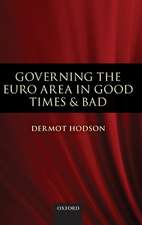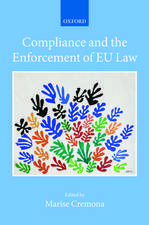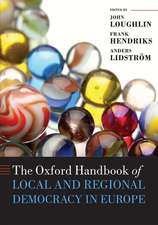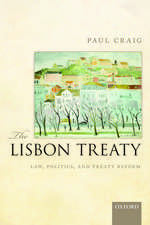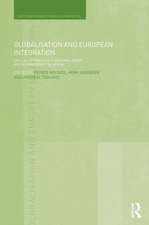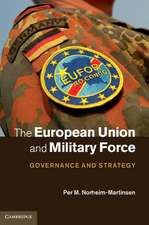Europe's Franco-German Engine
Editat de David P Calleo, Eric R. Staalen Limba Engleză Paperback – feb 1998
Throughout the postwar era a special relationship between France and Germany has often been the catalyst for European integration. The two countries have achieved jointly the leadership that neither could sustain alone. However, the Soviet collapse has presented them with a new agenda of problems. German unification has resurrected old geopolitical fears and has had disruptive economic consequences. Central European states are struggling to transform themselves into liberal democracies with market economies and clamoring to join the European Union, posing a formidable challenge to its practical cohesion, organizational patterns, and economic resources. Events in the former Yugoslavia have lent urgency to the need for decisive action on enlargement and exposed the fragility of Europe's capacity for collective military action. The Franco-German response has been to "deepen" the EU, while proceeding slowly on enlarging to the east. The partners have pursued their monetary goal with extraordinary fortitude and most observers believe they will achieve it in 1999. However, opinion is deeply divided over the wisdom or sustainability of such a course. This book explores how these issues are currently understood by French and German elites who have generated the current policies and are carrying them out. The essays--by three French, three German, and two American authors--reveal an impressive consensus, as well as widely differing views. They analyze the broad diplomatic, security, and economic dimensions of the bilateral relationship. The contributors are Gilles Andréani. Klaus-Peter Klaiber, François Heisbourg, Michael Stürmer, Jean-Pierre Landau, Ernst Welteke, and Patrick McCarthy. SAIS European Studies
Preț: 180.87 lei
Nou
Puncte Express: 271
Preț estimativ în valută:
34.62€ • 37.62$ • 29.10£
34.62€ • 37.62$ • 29.10£
Carte tipărită la comandă
Livrare economică 22 aprilie-06 mai
Preluare comenzi: 021 569.72.76
Specificații
ISBN-13: 9780815712794
ISBN-10: 0815712790
Pagini: 160
Dimensiuni: 152 x 229 x 10 mm
Greutate: 0.26 kg
Editura: Brookings Institution Press
Colecția Brookings Institution Press
Locul publicării:United States
ISBN-10: 0815712790
Pagini: 160
Dimensiuni: 152 x 229 x 10 mm
Greutate: 0.26 kg
Editura: Brookings Institution Press
Colecția Brookings Institution Press
Locul publicării:United States
Notă biografică
David P. Calleo is director of European Studies at the Paul H. Nitze School of Advanced International Studies (SAIS) of the Johns Hopkins University. His previous books include The Bankrupting of America (Avon, 1993). Eric R. Staal is a Ph.D. candidate in the Department of European Studies at School of Advanced International Studies (SAIS) of the Johns Hopkins University.
Descriere
Throughout the postwar era a special relationship between France and Germany has often been the catalyst for European integration. The two countries have achieved jointly the leadership that neither could sustain alone. However, the Soviet collapse has presented them with a new agenda of problems. German unification has resurrected old geopolitical fears and has had disruptive economic consequences. Central European states are struggling to transform themselves into liberal democracies with market economies and clamoring to join the European Union, posing a formidable challenge to its practical cohesion, organizational patterns, and economic resources. Events in the former Yugoslavia have lent urgency to the need for decisive action on enlargement and exposed the fragility of Europe's capacity for collective military action. The Franco-German response has been to "deepen" the EU, while proceeding slowly on enlarging to the east. The partners have pursued their monetary goal with extraordinary fortitude and most observers believe they will achieve it in 1999. However, opinion is deeply divided over the wisdom or sustainability of such a course. This book explores how these issues are currently understood by French and German elites who have generated the current policies and are carrying them out. The essays--by three French, three German, and two American authors--reveal an impressive consensus, as well as widely differing views. They analyze the broad diplomatic, security, and economic dimensions of the bilateral relationship. The contributors are Gilles Andréani. Klaus-Peter Klaiber, François Heisbourg, Michael Stürmer, Jean-Pierre Landau, Ernst Welteke, and Patrick McCarthy. SAIS European Studies

